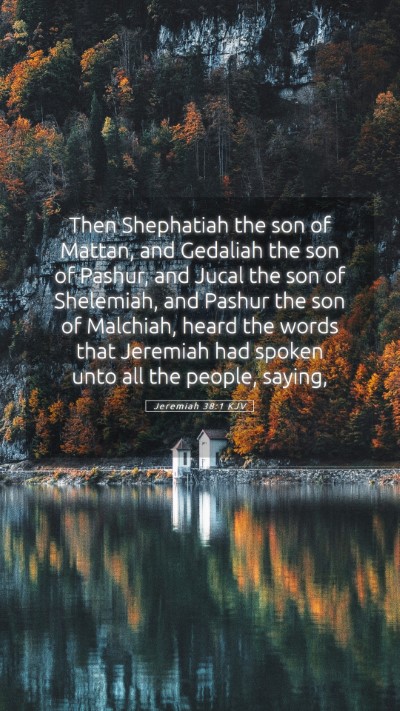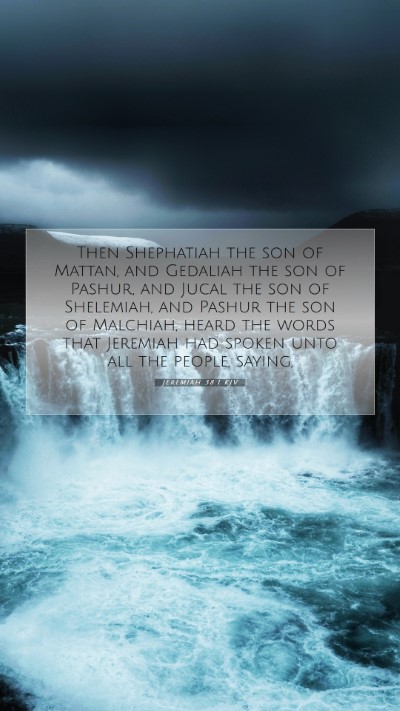Understanding Jeremiah 38:1
The verse Jeremiah 38:1 is a poignant piece of scripture that reveals the intricate dynamics of prophetic ministry, political strife, and personal struggle during a tumultuous time in Israel's history.
This verse highlights the actions of specific key figures who were involved in the court of King Zedekiah and serves as a parallel to broader themes in biblical prophecy. Understanding the context and meaning of this verse is vital for those seeking insights into scripture analysis and deeper Bible verse interpretations.
Bible Verse Explanation
In Jeremiah 38:1, we encounter a sensitive and critical juncture where Jeremiah is speaking to the leadership of Judah during the siege of Jerusalem.
The verse states: "Then Shephatiah the son of Mattan, and Gedaliah the son of Pashhur, and Juval the son of Shelemiah, and Pashhur the son of Malchijah heard the words that Jeremiah had spoken unto all the people, saying..."
This introduction sets the stage for a confrontation regarding Jeremiah's prophecies and his standing with the ruling powers.
Key Themes and Insights
-
Prophetic Authority: The individuals named in this verse represent a faction of leaders who are critical of Jeremiah's prophetic declarations concerning the fall of Jerusalem.
Matthew Henry emphasizes the tension between God’s word through the prophet and the prevailing political atmosphere, showcasing the frequent clash between divine messages and human governance.
-
Opposition to God's Message: The response of these leaders highlights a common theme in scripture where those in power often resist God’s truth.
Albert Barnes notes that this resistance stems from fear of losing power and prestige, revealing human nature's tendency to prioritize personal interests over divine guidance.
-
Historical Context: Adam Clarke provides a broader historical background, stating that this period was marked by Babylonian siege, national desperation, and the impending doom of the city.
Understanding this context is essential for a thorough biblical exegesis, as it frames Jeremiah's role during one of Israel’s darkest moments.
-
God's Faithfulness: Despite the hostility faced by Jeremiah, this verse assures readers of God's unwavering commitment to His promises.
The ongoing conflict illustrates that God continues to communicate with His people, often through messengers who bear unpopular truths.
Application of Jeremiah 38:1
As believers, understanding scripture like Jeremiah 38:1 can illuminate how we approach difficult passages and navigate our lives amidst opposition.
This verse encourages us to:
-
Seek God’s guidance even when it is unpopular or difficult, much like Jeremiah.
-
Stand firm in faith when facing opposition, drawing strength from God’s word.
-
Recognize the importance of prophetic voices in our communities and the impact they may have on societal issues.
Related Bible Cross References
- Jeremiah 37:2: Discusses Zedekiah’s disregard for Jeremiah’s warnings.
- Jeremiah 26:8: Relates Jeremiah’s prophecies and the hostility he faced.
- Ezekiel 3:17: Talks about the role of watchmen and their messages.
Conclusion
In summary, Jeremiah 38:1 presents crucial themes in prophetic ministry and political struggle that resonate throughout biblical history.
For those engaged in Bible study groups, online Bible study, or seeking deeper Bible study insights, this verse offers fertile ground for understanding the complexities of faith amidst societal strife.
By delving into the significance of such verses, we enrich our understanding of scripture and how it applies to our daily lives, making these ancient texts truly relevant today.
Further Study Resources
To enhance your Bible study experience, consider utilizing the following:
- Comprehensive Bible study guides that focus on prophetic literature.
- Online platforms for Bible study lessons that delve into Old Testament history.
- Bible study tools for in-depth analysis of difficult passages.


